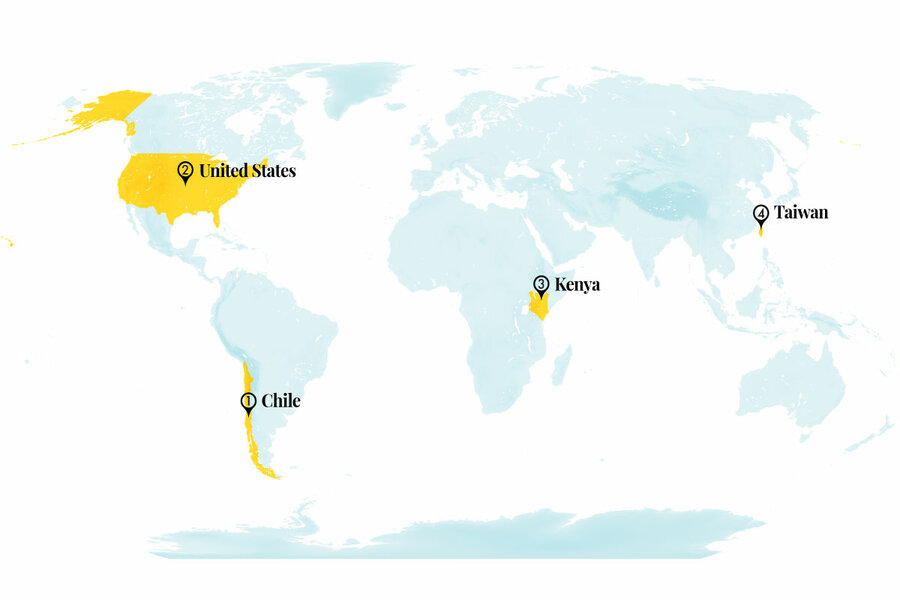Children of adoption: How families from Chile to Taiwan are made whole
Loading...
1. Chile
More of Chile’s “stolen babies” are finding their biological families. Tens of thousands of babies were adopted illegally during the 1970s and 1980s under the dictatorship of Augusto Pinochet. Birth mothers were often told that their children were stillborn or were threatened into silence by government, church, and health care professionals who then facilitated foreign adoptions, in many cases to lower the national poverty rate.
Nos Buscamos (meaning “We look for each other”), which has reunited 400 families since 2014, is one of two organizations in Chile conducting searches to match these adults with biological family members. They begin by sorting through basic data like birthplace, the name of a hospital, or the contact of an adoption agency. Though information is often scarce, this helps narrow down the field for genetic testing.
Why We Wrote This
In our progress roundup, lawmakers and charity groups are expanding the meaning of family for children and adults. In Chile, adoptees born during dictatorship are being reunited with birth parents. And in Taiwan, LGBTQ+ couples gain the right to adopt.
Scott Lieberman, an American from San Francisco, was recently reunited with his extended family in Chile. “I lived 42 years of my life without knowing that I was stolen,” he said. “I want people to know ... there are families out there that can still be reunited.”
Sources: Rest of World, CNN
2. United States
Nusrat Choudhury made history as the first Muslim woman to become a federal judge. The daughter of immigrants, Ms. Choudhury will also be the first Bangladeshi American on the federal bench. She previously worked as the legal director of the American Civil Liberties Union of Illinois and has been described by colleagues as a “trailblazing civil rights lawyer.” She begins a lifelong appointment on the U.S. District Court for the Eastern District of New York.
Zahid Quraishi became the first Muslim federal judge in 2021. The Senate also confirmed Dale Ho as a federal judge in June, raising to 21 the number of Asian Americans on the bench. “A different perspective can permit you to more fully understand the arguments that are before you and help you articulate your position in a way that everyone will understand,” said Sonia Sotomayor, the first and only Hispanic justice on the Supreme Court, in 2016.
Sources: CNN, The New York Times
3. Kenya
An agricultural system known as push-pull is minimizing pesticides and boosting yields in western Kenya. The approach consists of planting a “push” plant alongside a primary crop, like maize, to repel female pests from laying eggs, and a “pull” plant that attracts the pests to the perimeter of the field but is not a good host. The majority of these pests don’t survive.
A study of 476 farmers and 24 crop seasons found that yields more than doubled using this process. And it can help phase out pesticides. “While there is often some start-up cost and labour involved, reduced pesticide costs year over year can be a substantial economic benefit,” says Zeyaur Khan, a co-author of the study. The researchers say the push-pull system is longer-lasting than pesticides, because insects can develop resistance to the chemicals. The longer the method operates, the more effective it becomes. Fields adjacent to push-pull areas also saw decreases in insects.
About 10% to 40% of maize farmers in western Kenya have adopted the push-pull method in at least one field since the 1990s.
Sources: SciDev.net; Agriculture, Ecosystems & Environment
4. Taiwan
Taiwan extended adoption rights to same-sex couples. Taiwan became the first country in Asia to legalize same-sex marriage in 2019. Until recently, same-sex couples were only allowed to adopt children biologically related to one of the partners. (A year ago, same-sex adoption was also legalized in Slovenia and Croatia.)
The change follows a late 2021 ruling that granted a man in Kaohsiung City the right to jointly adopt his husband’s adopted child. “Parental love is the same, and only through joint adoption can we protect the rights and interests of each other by law,” said Fan Yun, a lawmaker from Taiwan’s ruling party, about the decision. In the capital city of Taipei, a recent Pride celebration drew over 120,000 people.
Sources: CNN, PinkNews
World
Inequality between countries has reached its lowest level in 150 years. Global inequality began to rise at the start of the Industrial Revolution and peaked during the Cold War. The world’s wealth is still largely concentrated in the West today. But in the past 20 years, economic growth in China and other parts of the world has reversed the trend, according to economist Branko Milanovic. The research uses the Gini coefficient, which assigns values of 0 to 100: A zero score means everyone holds the same amount of wealth, while a score of 100 means that one person holds it all. The change reflects “a wider shift of economic, technological, and even cultural power in the world,” wrote Mr. Milanovic.
Meanwhile, inequality within countries has increased in the same time period, though not everywhere. Inequality has grown within a number of major economies, including the United States, India, Russia, and China. Redistributive programs in Latin American countries like Brazil, Bolivia, and Mexico have contributed to greater equality. Whether the drop in global inequality between countries continues will depend partially on the trajectory of Africa’s wealth.
Source: Foreign Affairs








